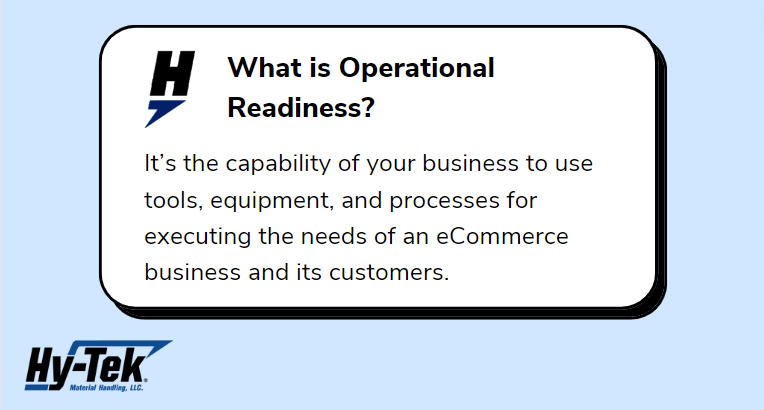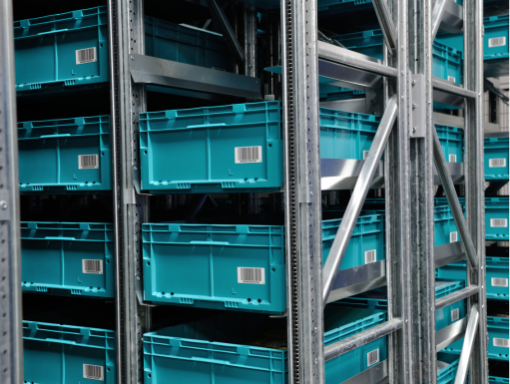Whether you’re new to the world of eCommerce or you’ve been around the block, there’s one thing every business owner should know: Operational readiness plays a fundamental role in the success and growth of your company. Here’s everything you need to know about the concept of operational readiness, why it matters, and how to make it an integral part of your eCommerce strategy.

What is Operational Readiness?
Operational readiness is the ability of a company to utilize tools, equipment, and processes needed to meet business demands and keep customers satisfied. It guarantees that every project goal is reached through testing and careful preparation so that regular operations can run as planned.
The concept of operational readiness originated within our military and is defined by the DoD as “the capability of a unit/formation, ship, weapon system, or equipment to perform the missions or functions for which it is organized or designed.” Now, when it comes to eCommerce, we’re dealing with workers, inventory, and other moving parts instead of weapons and soldiers.
Operational readiness is essential within any implementation project to help our customers with the execution aspects of their eCommerce strategy. It’s a necessary layer in figuring out what tools are needed and how they will be constructed and leveraged to bring an operation together.
“Essentially, what we’re doing (at Hy-Tek) with operational readiness is teaching the customer and supporting them through the process,” said Ray DeMelfi, the Vice President of Consulting Services at Johnson Stephens Consulting, a division of Hy-Tek Integrated Systems. “We approach operational readiness as a way to help our clients with the execution aspect. We focus on various components of operational cost/expense — essentially helping them with things like building their staffing model, pinning down exactly how they want goods or people to flow through a system, and other important components of operational cost/expense.”
Things to Consider in Operational Readiness
No two businesses are exactly alike — and neither are their plans for operational readiness. Building an operational readiness plan is highly specific and truly depends on each customer and their situation. However, there are consistent steps that, in general, should be executed throughout any e-commerce implementation. Here are a few different factors to consider:
Factor 1: What processes do we need to support the operational objectives, and how can we adequately define/standardize them? It’s not as easy as “flipping a switch.” Understanding how to build a plan that will ramp up the operation and lay the foundation for success.
Factor 2: How will goods and people flow through the system? What does the operating environment look like, and how can you organize it to support workflow?
Factor 3: What are the proper tools required for associates to operate efficiently? It’s not just about the tools and equipment, but how to best utilize them to scale.
Factor 4: How will we document processes? Data is everything in today’s world. Document everything, and use that information to improve processes down the line.
Factor 5: What staffing and training requirements should we consider? You’ll need to consider things like how many people you need in each area in the building, and what skill sets are necessary for optimal performance.
Factor 6: How do we migrate and ramp up the operation? The sizing and outfitting of your system will drive your migration plan when you’re transitioning into your facility, hiring and training associates, and then ramping up and going live.
Indicators of Operational Readiness Success
Go-live success is predicated on how well an operational readiness plan is executed. If you’re operating at less than the intended capacity at go-live, then the operational readiness plan wasn’t quite executed properly or completely. Here are several key indicators that demonstrate whether an operational readiness plan was executed properly or not.
1. Ramp up of operations is smooth.
2. Preparation milestone timelines are met.
3. Testing protocols and training are complete with a high confidence level from the operations team.
4. The inventory is properly positioned.
5. The go-live date and ramp-up timeline are realized.
“Typically, if things on the operational readiness side are going well, we’re going to be hitting your targeted timelines,” explained DeMelfi. “Conversely, if you don’t have your associates trained or inventory properly positioned, your go-live date will be delayed.”
When it comes to measuring your operational readiness plan’s success, DeMelfi notes that it is often predicated on how successful the ramp-up or launch is. “The challenge,” he said, “is when external factors come into play. Still, the best indication of operational readiness success is whether or not you adhered to the schedule and launched on time.”
FAQs About Operational Readiness
Often, business owners have many questions when it comes to operational readiness and how to set their eCommerce operations up for success. We’ve listed a few common concerns that we’ve addressed with our own customers that could provide more insight into forming an operational readiness strategy.
Q: What is the correct timeline for operational readiness?
A: Essentially, operational readiness needs to be considered from the first engagement point on an implementation project. The delivery of a new operation requires thorough planning and consideration before turning your first screw, which is why it needs to be considered so early in the process. However, the execution of the process is heavily weighted to the back half of any project. For instance, with Hy-Tek’s ECOMPLETE solution, operational readiness will be executed throughout, but will truly ramp up in month three through month six of a six-month timeframe for an eCommerce solution.
Q: Do I need an operational readiness template or framework?
A: While customization is imperative to ensure that an operational readiness plan works, it is important to work closely with someone who is experienced in confidently building a plan. With ECOMPLETE, we can help identify proven processes, opportunities, and operations that allow for a more efficient ramp-up and lower customer risk.
Q: What about small businesses? Do they need to consider an operational readiness system?
A: Operational readiness is a step that applies to any project regardless of size or scale. You must always build a staffing plan, know how the operation affects labor needs, build a migration plan to ramp up and serve the customer, and have a training plan. It’s a common misconception that small businesses don’t need an operational readiness system, and that couldn’t be farther from the truth. Operational readiness is essential at every stage and is a requisite part of scaling your business down the line.
The Big Reason You Need Operational Readiness
Now that you have a better understanding of operational readiness, here’s the big reason why you need it: When you don’t execute an operational readiness plan (or fail to do it properly), it doesn’t become apparent until you’ve begun the ramp-up and go-live process.
This is exactly the wrong time to realize that your strategic investment is not set up for success. Without a comprehensive understanding and execution of an eCommerce operational readiness plan from the first engagement point, you may not be properly staffed, you might not have the right inventory strategy, your service expectations may fall short of your goal, and your customer service experience will certainly suffer. And that’s the last thing you want in the competitive world of eCommerce.
Why ECOMPLETE is Your Solution for Operational Readiness
At Hy-Tek & JSC, we view operational readiness as the guidance and know-how to execute and operate an eCommerce solution. This is why, throughout our ECOMPLETE solution, we emphasize operational readiness, and we implement it through an expedited timeline. Its inclusion is critical for ensuring that we can focus on speed-to-market and efficiency in implementation. ECOMPLETE is a solution that helps companies improve existing eCommerce platforms or enter into eCommerce for the first time. This service is vital in allowing us to ramp up and rapidly deploy the operation, and mitigate the risk factors when taking a new eCommerce operation live.
We also use operational readiness as an indication of the partnership aspect of the ECOMPLETE solution. We share ownership of the operational plan with our customers. We don’t just hand over a solution and expect them to execute it. The customer’s realization of success should be our main measure of success.
“We make it clear to our customers that we want them to succeed just as much as they do,” said DeMelfi. “It’s a team effort, and we’ll help them learn how to execute their operational readiness plan properly throughout the process to increase their likelihood of success.”
If you’re interested in learning more about how operational readiness at ECOMPLETE allows for a smarter, more efficient total eCommerce solution, talk to one of our experts today.






